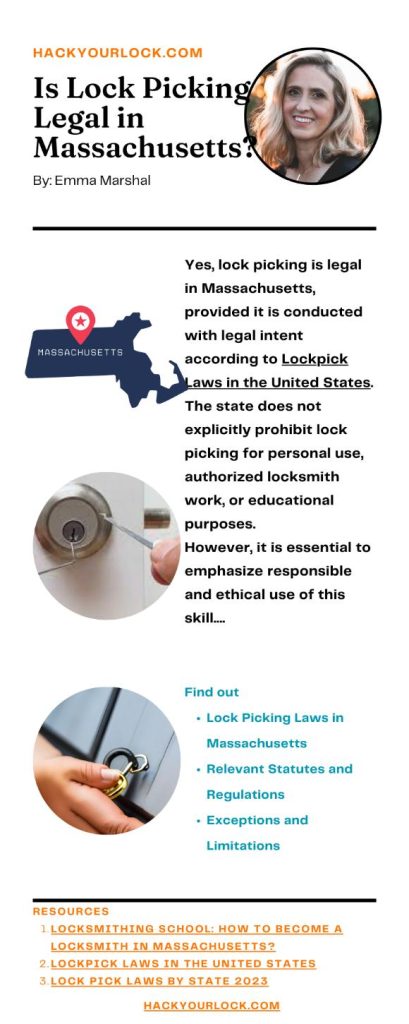Hey pals, ever been curious about the secrets of lock picking in Massachusetts?
It is like being a real-life detective! But before you start practicing this cool skill, there’s something important to know – “Is lock picking legal in Massachusetts?” We’re here to unravel the mystery and understand the rules.

So, join us on this adventure as we explore the world of locks and keys, making sure we’re doing things the right way! Get ready to unlock the knowledge – the fun way!
Contents
Is Lock Picking Legal in Massachusetts?

Yes, lock picking is legal in Massachusetts, provided it is conducted with legal intent according to Lockpick Laws in the United States. The state does not explicitly prohibit lock picking for personal use, authorized locksmith work, or educational purposes.
However, it is essential to emphasize responsible and ethical use of this skill. Practitioners should be aware of and adhere to any relevant regulations, ensuring they engage in lock picking activities within the confines of the law.
Whether exploring the craft for personal interest or pursuing a career in locksmithing, individuals should prioritize lawful and respectful application of lock picking skills.
This approach not only promotes a positive image of the practice but also contributes to maintaining security and trust within the community.
Lock Picking Laws in Massachusetts

Lock picking laws in Massachusetts revolve around the question, “Is lock picking legal in Massachusetts?” Lock picking laws in Massachusetts are governed by specific statutes designed to regulate the possession and use of lock-picking tools.
Relevant Statutes and Regulations
Here is the information about relevant statutes and regulations regarding lock picking laws in Massachusetts presented in a table format:
| Statute/Regulation | Description |
| Massachusetts General Laws, Chapter 266, Section 16C | Prohibits breaking and entering into a building, which may encompass unauthorized entry using lock picking tools with intent to commit a crime. |
| Massachusetts General Laws, Chapter 266, Section 49 | Addresses the possession of tools or instruments adapted for breaking into a building, including lock-picking tools. |
| Massachusetts General Laws, Chapter 112, Section 60 | Governs the licensure of locksmiths in the state, establishing requirements for certification and licensing. |
| Massachusetts General Laws, Chapter 112, Section 64A | Imposes penalties for the unlicensed practice of locksmithing, emphasizing the importance of proper certification and adherence to licensing regulations. |
| Massachusetts General Laws, Chapter 140, Section 134B | Regulates the sale and possession of locksmithing tools, requiring licensing for those engaged in the business of selling or possessing such tools. |
Conditions under Which Lock Picking is Considered Legal or Illegal in Massachusetts
| Condition | Legal Status |
| Lock Picking with Consent | Legal |
| Lock Picking by Licensed Locksmiths | Legal |
| Lock Picking for Legitimate Purposes | Legal |
| Unauthorized Entry with Lock Picking Tools | Illegal |
| Possession of Burglary Tools without Justification | Illegal |
| Use of Lock Picking Tools for Criminal Intent | Illegal |
| Locksmiths without Proper Licensing | Illegal |
There is a comprehensive article on Is lock picking illegal in the US for detailed information on all states in this regard.
Following table summarizes the key points from Massachusetts General Laws Chapter 266 §49, in Lockpick Laws In the United States.
| Massachusetts General Laws Chapter 266 §49 | This statute addresses the creation, possession, or use of tools, machinery, or implements specifically designed for breaking into buildings or depositories with the intent to commit theft or any other crime.
If an individual makes, mends, or possesses such tools with the knowledge of their purpose and intends to use them for unlawful activities, they can be subject to imprisonment as a penalty for their actions. The law aims to deter the possession and use of burglary tools for criminal activities. |
Exceptions and Limitations
In Massachusetts, lock picking is legally permitted for licensed locksmiths, law enforcement personnel, and individuals with explicit property owner consent.
Licensing Requirements of Locksmiths in Massachusetts
Embarking on the journey to become a locksmith in Massachusetts doesn’t follow a strict set of rules, but certain keys open doors according to Locksmithing School: How to Become a Locksmith in Massachusetts?
| Aspect | Details |
| Nature of Work | Locksmiths in Massachusetts make keys, repair, and install locks for homes, businesses, and vehicles. |
| Business Setup | Often self-employed or family-owned businesses. Minimal investment required. Can work from home or a mobile van with necessary tools. |
| Regulation | The locksmith trade in Massachusetts is not regulated. No specific locksmith license is required. |
| Tools and Equipment | Essential locksmith tools include key cutting and automotive key programming machines. |
| Eligibility Criteria | – Age: 18 years or older. – Education: No formal degree or training certification required. – Criminal History: A clean background is preferred. – Key Skills: Mechanical and mathematical ability, knowledge of lock components. |
| License and Certification | State-issued business license or a local business license is generally required. Professional certifications are recommended. |
| Average Salary | $50,000 – $60,000 per year (approximate average in the US as of August 2022, Source: Salary.com). |
| Path to Becoming a Locksmith in Massachusetts | 1. Get locksmith training (trade school). 2. Work as an apprentice locksmith. 3. Obtain locksmith certifications (optional). 4. Find work with local locksmith companies or start your own business. 5. Join a trade association for ongoing industry support. 6. Continue upgrading skills in the evolving security technology landscape. |
Penalties for Illegal Lock Picking
🔒 Fines: Up to $5,000 for unauthorized lock picking activities.
🚫 Probation: Offenders may face probation ranging from 6 months to 2 years.
Imprisonment: Serious offenses may lead to imprisonment, varying from 6 months to 5 years.
Do you want to know about similar aspects related to lock picking in other states as well? Other states like California, Arizona, Alaska, Alabama, Ohio, New York, Washington, Florida, Virginia, Colorado, Connecticut, Delaware , Georgia, Hawaii, Iowa, Idaho, Kansas, Kentucky, Louisiana etc. have also similar regulations.
Conclusion
For the curious student intrigued by the art of locks and keys, or the locksporter passionate about honing their skills, it’s crucial to grasp the legal landscape.
In Massachusetts, the answer to “Is lock picking legal in Massachusetts?” leans toward the affirmative, but with a caveat. While no specific regulations govern the locksmith trade, unauthorized lock picking can incur hefty fines, probation, or even imprisonment.
So, whether you’re a student exploring the craft or a locksporter perfecting your technique, remember to respect the law and ensure your locksmithing adventures stay on the right side of legality in the Bay State. Lock responsibly!
FAQ’s
- Is lock picking legal for hobbyists in Massachusetts?
- Yes, lock picking is generally legal in Massachusetts for hobbyists. However, enthusiasts should be mindful of using their skills responsibly and within the boundaries of the law, avoiding any unauthorized or malicious activities.
- Are there specific regulations for locksmiths in Massachusetts?
- Unlike some states, Massachusetts does not have specific regulations for locksmiths. However, practitioners should still adhere to legal and ethical standards, and aspiring locksmiths may find it beneficial to pursue professional certifications for credibility.
- What are the penalties for illegal lock picking in Massachusetts?
- Engaging in unauthorized lock picking can lead to penalties, including fines, probation, or imprisonment. The severity of the consequences depends on the circumstances of the offense. It is crucial to locksmith responsibly and stay informed about the legal implications in Massachusetts.
Resources
- Locksmithing School: How to Become a Locksmith in Massachusetts?
- Lockpick Laws In the United States
- Lock Pick Laws by State 2023
